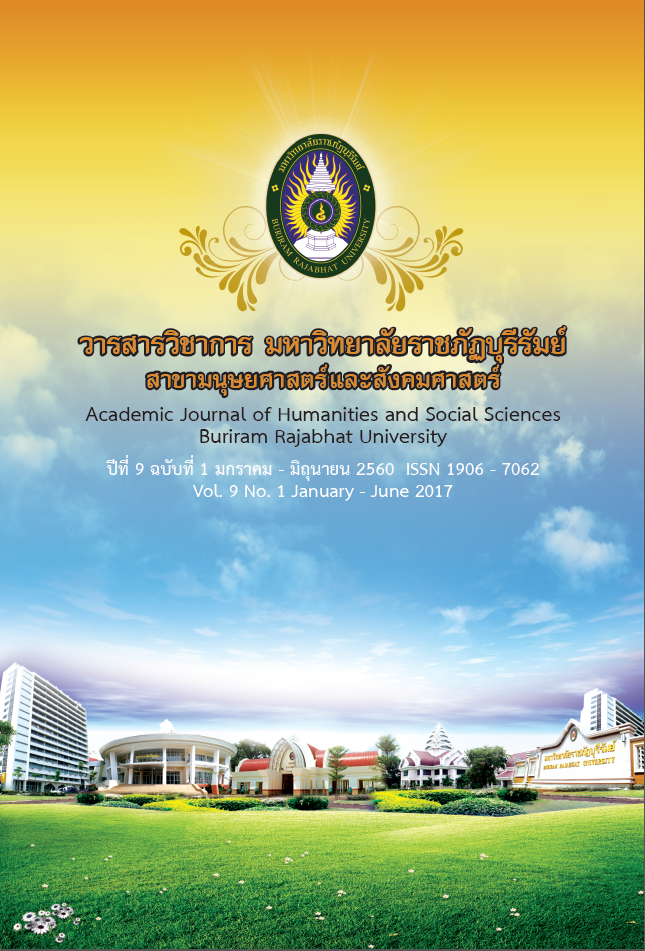ภูมิปัญญาท้องถิ่นในการจัดการทรัพยากรนํ้าของชุมชนบ้านหนองเขื่อง อำเภอเมือง จังหวัดชัยภูมิ
Main Article Content
บทคัดย่อ
การวิจัยครั้งนี้มีวัตถุประสงค์เพื่อศึกษาภูมิปัญญาท้องถิ่นในการจัดการทรัพยากรนํ้าของ
ชุมชนบ้านหนองเขื่อง และศึกษาพลวัตภูมิปัญญาท้องถิ่นในการจัดการทรัพยากรน้ำของชุมชนบ้าน
หนองเขื่อง อำเภอเมือง จังหวัดชัยภูมิ โดยใช้การสำรวจชุมชน การสัมภาษณ์เชิงลึก และการประชุม
สนทนากลุ่ม ชาวบ้านในชุมชนบ้านหนองเขื่อง และผู้นำชุมชน จำนวน 40 คน
จากการศึกษา ภูมิปัญญาท้องถิ่นในการจัดการทรัพยากรนํ้าของชุมชนบ้านหนองเขื่อง และ
ภูมิปัญญาท้องถิ่นในการจัดการทรัพยากรนํ้าของชุมชนบ้านหนองเขื่อง อำเภอเมือง จังหวัดชัยภูมิ พบว่า
ภูมิปัญญาในการจัดการนํ้าของชุมชนบ้านหนองเขื่องมีรูปแบบการจัดการนํ้าร่วมกัน เน้นผลประโยชน์
โดยใช้การปลูกจิตสำนึกให้คนในชุมชนไม่เบียดเบียนทำลายสิ่งแวดล้อมด้วยการนำเอาความเชื่อและ
พิธีกรรมต่างๆ ของชุมชนท้องถิ่นเข้ามาผสมผสานกับการบริหารจัดการนํ้าในชุมชน ด้านกายภาพ
ด้านสังคม ด้านเศรษฐกิจ ด้านวัฒนธรรม และด้านความเชื่อ ปัจจัยที่มีผลต่อพลวัตการเปลี่ยนแปลง
ภูมิปัญญาท้องถิ่น คือ ปัจจัยภายในชุมชน ได้แก่ เด็กและเยาวชนไม่ตระหนักถึงคุณค่าของภูมิปัญญา
ขาดการการสืบสานภูมิปัญญาท้องถิ่น เป็นต้น และ ปัจจัยภายนอก ได้แก่ การพัฒนาตามนโยบายของรัฐ
การเปลี่ยนแปลงของระบบเศรษฐกิจทุนนิยม ระบบการศึกษาที่มุ่งเน้นตำรามากกว่าการนำความรู้มา
ใช้ในชีวิตประจำวัน การอพยพไปทำงานต่างถิ่นเนื่องจากผลตอบแทนด้านรายได้ที่สูงกว่า
This research aims to study local wisdom regarding water resource management
in the community of Nong Keung Village, Kut Tum, Muang, Chaiyapum and the
dynamics thereof. Data were collected from 40 villagers and elders of the community
using community survey, in-depth interviews, and focus group discussions.
The results of the research on local wisdom regarding water resource management
in the community of Nong Keung Village, Kut Tum, Muang, Chaiyapum showed that
the method encouraged by local wisdom was inclusive, with an emphasis on benefits,
through encouraging the conscience of the community against environmental
exploitation, which was achieved by mixing resource management service techniques
with various aspects of local faith and ritual, in the physical, social, economic, cultural
and religious aspects.
Internal factors affecting the dynamics of local wisdom included the youth and
children being unaware of the values of local wisdom, and the lack of continuation
of local wisdom. External factors affecting the dynamics of local wisdom included
government policies regarding development, changes occurring in the capitalist economic
system, an education system focused on textbook education rather than the
use of knowledge in everyday life and the migration of local people to other areas
due to higher profit.
Article Details
- ต้นฉบับที่ได้รับการตีพิมพ์ในวารสารวิชาการ มหาวิทยาลัยราชภัฏบุรีรัมย์ สาขามนุษยศาสตร์และสังคมศาสตร์ ถือเป็นกรรมสิทธิ์ของมหาวิทยาลัยราชภัฏบุรีรัมย์ ห้ามนำข้อความทั้งหมดหรือบางส่วนไปพิมพ์ซ้ำเว้นเสียแต่ว่าจะได้รับอนุญาตจากมหาวิทยาลัยฯ เป็นลายลักษณ์อักษร
- เนื้อหาต้นฉบับที่ปรากฏในวารสารเป็นความรับผิดชอบของผู้เขียน ทั้งนี้ไม่รวมความผิดพลาด อันเกิดจากเทคนิคการพิมพ์


